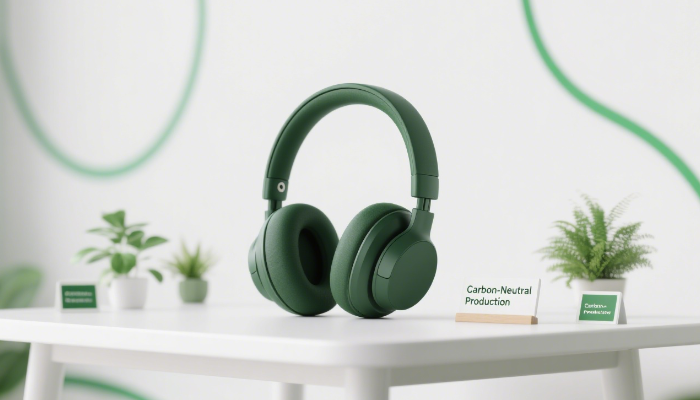- Missed It? Get a Second Chance. Black Friday Reloaded.
US$0.00
Greener Audio: Eco-Friendly Materials and Carbon-Neutral Production in Headphones
The world of headphones is rapidly evolving—not just in terms of sound, but also sustainability. Today’s environmentally conscious consumers are seeking audio products that offer performance without compromising the planet. Innovations in biodegradable materials and net-zero carbon manufacturing are leading the way. Here’s a closer look at how eco-friendly headphones are becoming a reality.
Why Sustainability Matters in Headphones
The production of traditional headphones often involves plastics, metals, and processes that are energy-intensive and resource-draining. Raw material extraction and processing alone can account for more than half the carbon emissions tied to the manufacturing process1. With tens of millions of headphones sold each year, this impact is considerable.
Eco-Friendly Materials: What Are Headphones Made From?
Bioplastics and Biodegradable Components
- Bioplastics from Wood Pulp: Thinksound’s ov21 headphones use Eastman Trēva bioplastic—derived from sustainable wood pulp—to replace petroleum-based plastics in their products. This shift greatly reduces dependency on non-renewable resources and makes for a lighter environmental footprint.
- Bio-Cellulose Drivers: Majority, a British audio brand, has developed true wireless earbuds with bio-cellulose speaker drivers and biodegradable plastic in both the earbuds and their charging case1.
- Fungal Materials: Some experimental headphone models are even using materials made from fungus, showcasing innovative directions biodegradable electronics can take.
- Bamboo, Recycled Aluminum, and Fabrics: Brands like House of Marley integrate bamboo, FSC-certified wood, recycled plastics, and aluminum in their headphones, making use of renewable and reclaimed resources2.
Recycled and Upcycled Elements
- Recycled ABS Plastic: Companies such as Sony and ADAM Audio have developed high-quality headphones using post-consumer recycled ABS plastics, maintaining product durability while minimizing the use of new, virgin plastics34.
- Repairable and Modular Designs: Certain brands, especially segments from Sennheiser and Beyerdynamic, offer modular constructions, making it easier to repair or replace individual parts and thus extend headphone life.
Carbon-Neutral Manufacturing in Headphones
The Rise of Net-Zero Audio Products
- Skullcandy’s Transparency Series: The Hesh Evo wireless headphones are produced with a net-zero carbon footprint, thanks to effective carbon offsetting and investments in carbon-capture programs. Skullcandy assesses and publishes emissions related to their products, allowing customers to see the environmental impact and the concrete steps taken to mitigate it. Since 2019, the company has also diverted hundreds of thousands of headphones from landfills through refurbishing and recycling initiatives5.
- Cleer ARC 3 – World’s First Zero-Carbon Earbuds: Produced by Shenzhen Grandsun Electronic Co., the ARC 3 earbuds have achieved carbon neutrality by maximizing recyclable materials, utilizing green electricity, and deploying energy-efficient technologies. This commitment is part of a broader push in China to meet ambitious carbon reduction and neutrality goals in manufacturing.
| Brand/Model | Eco-Friendly Material(s) | Carbon Neutral Production | Special Notes |
|---|---|---|---|
| Thinksound ov21 | Metal, vegan leather, bioplastic | No | Sustainably sourced walnut inlays |
| House of Marley | Bamboo, FSC wood, recycled plastic | No | Proceeds support global reforestation |
| Majority Earbuds | Biodegradable plastic, bio-cellulose | No | Biodegradable case and drivers1 |
| Skullcandy Hesh Evo | Recycled materials | Yes | 100% recyclable packaging, carbon offsets5 |
| Cleer ARC 3 | Recyclable materials | Yes | Certified zero-carbon earbuds (China) |
| Sony LinkBuds | Recycled ABS plastic | No | Highly distinctive coloration3 |
| ADAM Headphones | 85% recycled plastics | No | Post-consumer ABS plastic4 |
The Road Ahead: Making Music Sustainable
- Lifecycle Thinking: True sustainability looks at the complete life of a product—from sourcing and production to repairability and end-of-life recycling2.
- Innovative Partnerships: Brands are collaborating with environmental organizations and tech companies to drive circular economies—making sure the next generation of headphones minimizes waste and maximizes positive impact5.
Eco-friendly materials and carbon-neutral production practices are turning headphones into ambassadors for a cleaner future. As technology and sustainable design continue to grow together, music lovers can enjoy their favorite sounds with a lighter environmental footprint.
- https://www.forbes.com/sites/marksparrow/2023/02/08/majority-launches-sustainable-and-biodegradable-true-wireless-earbuds/
- https://playitgreen.com/sustainable-headphones-go-green-with-your-tunes/
- https://www.sony.com/lr/electronics/eco/headphones
- https://www.adam-audio.com/en/news/industry/a-personal-best-in-sustainable-product-design/
- https://townlift.com/2022/10/skullcandy-releases-its-first-carbon-neutral-headphones/

XIMAND Blog
Here, we dive into the ever-evolving world of electronics—from smartphones and laptops to smart home gadgets, wearables, and cutting-edge AI innovations. Whether you’re looking for in-depth reviews, practical tips, or insights into industry trends, you’ll find valuable content tailored for you.
Technology isn’t just changing the way we live—it’s reshaping the future. Whether you’re a tech enthusiast, a casual user, or simply searching for the perfect gadget, this blog offers expert, unbiased, and easy-to-understand guidance.
.

Product categories
Posts Widget
Join our newsletter
Get our emails for info on new items, sales and much more.
Register now to get latest updates on promotions & coupons. Don’t worry, we not spam!
Your Phone’s Ultimate Case.
Join thousands who trust Ximand for daily durability without sacrificing style.
Need Help?
Customer Service
- -5% for all order in this week
- Free delivery for all orders






